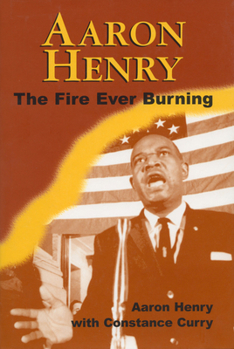Aaron Henry: The Fire Ever Burning
(Part of the Margaret Walker Alexander Series in African American Studies Series)
Select Format
Select Condition 
Book Overview
Although Aaron Henry (1922-1997) was one of the nation's major grassroots fighters in the freedom movement on local, state, and national levels, his name has not yet been accorded its full recognition. This book reveals why Aaron Henry should be acknowledged, in the ranks of Fannie Lou Hamer and Medgar Evers, as a truly influential crusader. Long before many of his contemporaries, he was a civil rights activist, but he preferred to stay out of the limelight. A certified pharmacist and owner of Fourth Street Drug Store in Clarksdale, he considered himself a down-home businessman who must not leave Mississippi. Although he was a key figure in bringing Head Start, housing, employment, and health service to his state, his tact and his quiet diplomacy garnered him less attention than more radical protesters received. Born in the age of segregation in the Mississippi Delta, the son of a sharecropper, he became state president of the NAACP in 1959. He was able, more than any previous leader, to unite Mississippi blacks, despite diversities of age, ideology, and class, in confronting white supremacy. He spearheaded the formation of the Mississippi Freedom Democratic Party and the Council of Federated Organizations (COFO). Some activists criticized him for urging protesters to take the middle ground between the NAACP's conservative position and SNCC's militant activism. Facing recurring death threats, thirty-three jailings, and Klan bombings of his home and drugstore, Henry remained stalwart and courageous. John Dittmer describes him as a "conservative militant," willing not only to risk his life but also to compromise on issues of strategy even when doing so led to alienation from outspoken activists. Constance Curry has shaped this personal narrative of a brave and underacknowledged man who helped to change his state forever. To his candid story, transcribed from interviews he gave two young historians in 1965, Curry adds new material from her own interviews with his family, friends, and political associates. Henry's prophetic voice documents a momentous period in African American history that extends from the Great Depression through the civil rights movement in the pivotal 1960s.
Format:Hardcover
Language:English
ISBN:1578062128
ISBN13:9781578062126
Release Date:February 2000
Publisher:University Press of Mississippi
Length:288 Pages
Weight:1.35 lbs.
Dimensions:1.0" x 6.3" x 9.3"
Customer Reviews
1 rating
Another Beautiful Book
Published by Thriftbooks.com User , 21 years ago
"The Fire Ever Burning" by Aaron Henry and Constance Curry is an important contribution about the Civil Rights Movement. Henry was loved by his friends and was considered to be astute, brave and caring. As was often typical of the times, he was accused of some rotten stuff. How else do you stop people from obtaining their rights? Constance Curry, who wrote this book from Henry's papers, lived the Civil Rights Movement and was actively involved in the Mississippi Delta where Henry lived. She is a careful researcher and writes from the heart. Like "Silver Rights" by Curry, about school integration in the Delta, this book is another good read and I highly recommend it.





